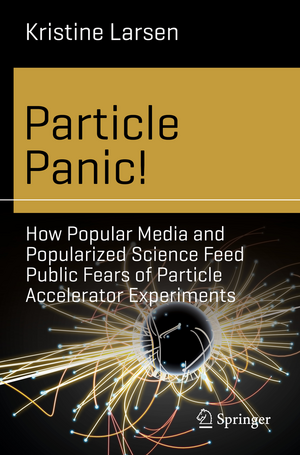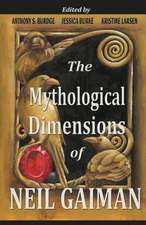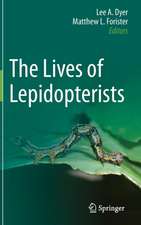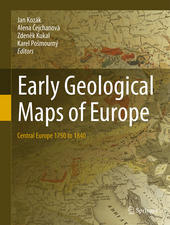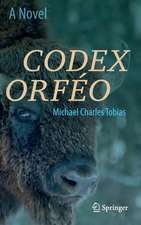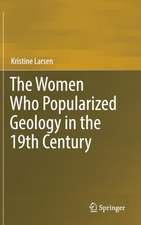Particle Panic!: How Popular Media and Popularized Science Feed Public Fears of Particle Accelerator Experiments: Science and Fiction
Autor Kristine Larsenen Limba Engleză Paperback – 15 apr 2019
This book surveys media depictions of particle accelerator physics and the perceived dangers these experiments pose. In addition, it describes the role of scientists in propagating such fears and misconceptions, offering as a conclusion ways in which the scientific community could successfully allay such misplaced fears through more effective communication strategies.
The book is aimed at the general reader interested in separating fact from fiction in the field of high-energy physics, at science educators and communicators, and, last but not least, at all scientists concerned about these issues.
About the Author
KristineM Larsen holds a Ph.D. in Physics and is currently a professor at Central Connecticut State University, New Britain, CT, in the Geological Sciences Department. She has published a number of books, among them The Women Who Popularized Geology in the 19th Century (Springer, 2017), The Mythological Dimensions of Neil Gaiman (eds. Anthony Burdge, Jessica Burke, and Kristine Larsen. Kitsune Press, 2012. Recipient of the Gold Medal for Science Fiction/Fantasy in the 2012 Florida Publishing Association Awards), The Mythological Dimensions of Doctor Who (eds. Anthony Burdge, Jessica Burke, and Kristine Larsen. Kitsune Press, 2010), as well as Stephen Hawking: A Biography (Greenwood Press, 2005) and Cosmology 101 (Greenwood Press, (2007).
Din seria Science and Fiction
-
 Preț: 129.05 lei
Preț: 129.05 lei -
 Preț: 104.10 lei
Preț: 104.10 lei -
 Preț: 103.05 lei
Preț: 103.05 lei -
 Preț: 104.92 lei
Preț: 104.92 lei - 5%
 Preț: 102.99 lei
Preț: 102.99 lei -
 Preț: 105.96 lei
Preț: 105.96 lei -
 Preț: 222.75 lei
Preț: 222.75 lei -
 Preț: 162.50 lei
Preț: 162.50 lei -
 Preț: 146.18 lei
Preț: 146.18 lei - 5%
 Preț: 218.95 lei
Preț: 218.95 lei -
 Preț: 128.64 lei
Preț: 128.64 lei -
 Preț: 150.92 lei
Preț: 150.92 lei -
 Preț: 115.46 lei
Preț: 115.46 lei -
 Preț: 111.50 lei
Preț: 111.50 lei -
 Preț: 101.01 lei
Preț: 101.01 lei -
 Preț: 103.91 lei
Preț: 103.91 lei -
 Preț: 337.51 lei
Preț: 337.51 lei -
 Preț: 131.12 lei
Preț: 131.12 lei -
 Preț: 141.41 lei
Preț: 141.41 lei -
 Preț: 484.79 lei
Preț: 484.79 lei -
 Preț: 182.09 lei
Preț: 182.09 lei -
 Preț: 106.14 lei
Preț: 106.14 lei -
 Preț: 147.23 lei
Preț: 147.23 lei -
 Preț: 183.84 lei
Preț: 183.84 lei -
 Preț: 109.86 lei
Preț: 109.86 lei -
 Preț: 207.39 lei
Preț: 207.39 lei -
 Preț: 72.68 lei
Preț: 72.68 lei -
 Preț: 148.46 lei
Preț: 148.46 lei -
 Preț: 154.46 lei
Preț: 154.46 lei -
 Preț: 179.68 lei
Preț: 179.68 lei -
 Preț: 184.72 lei
Preț: 184.72 lei -
 Preț: 149.49 lei
Preț: 149.49 lei -
 Preț: 133.99 lei
Preț: 133.99 lei -
 Preț: 149.45 lei
Preț: 149.45 lei -
 Preț: 128.86 lei
Preț: 128.86 lei -
 Preț: 146.36 lei
Preț: 146.36 lei -
 Preț: 152.76 lei
Preț: 152.76 lei - 20%
 Preț: 225.95 lei
Preț: 225.95 lei -
 Preț: 214.22 lei
Preț: 214.22 lei -
 Preț: 190.49 lei
Preț: 190.49 lei -
 Preț: 168.11 lei
Preț: 168.11 lei -
 Preț: 174.83 lei
Preț: 174.83 lei -
 Preț: 111.33 lei
Preț: 111.33 lei -
 Preț: 183.23 lei
Preț: 183.23 lei -
 Preț: 147.28 lei
Preț: 147.28 lei -
 Preț: 185.07 lei
Preț: 185.07 lei
Preț: 146.58 lei
Nou
Puncte Express: 220
Preț estimativ în valută:
28.05€ • 29.18$ • 23.16£
28.05€ • 29.18$ • 23.16£
Carte disponibilă
Livrare economică 22 martie-05 aprilie
Preluare comenzi: 021 569.72.76
Specificații
ISBN-13: 9783030122058
ISBN-10: 3030122050
Pagini: 167
Ilustrații: XV, 194 p. 48 illus., 44 illus. in color.
Dimensiuni: 155 x 235 mm
Greutate: 0.3 kg
Ediția:1st ed. 2019
Editura: Springer International Publishing
Colecția Springer
Seria Science and Fiction
Locul publicării:Cham, Switzerland
ISBN-10: 3030122050
Pagini: 167
Ilustrații: XV, 194 p. 48 illus., 44 illus. in color.
Dimensiuni: 155 x 235 mm
Greutate: 0.3 kg
Ediția:1st ed. 2019
Editura: Springer International Publishing
Colecția Springer
Seria Science and Fiction
Locul publicării:Cham, Switzerland
Cuprins
Introduction: Anti-science Accelerator.- A Whirlwind Tour of Particles Physics.- Angels or Demons? Stereotypes of Scientists.- The End is Nigh - Fundamental Particle Fears.- Can You Hear Me Now? Impediments to Science Communication.- Searching for Security in an Unsafe World.- Pernicious Particles - Subatomic Particles as Villains.- Specters in Space-time.- Science Communication Redux – Returning to the Collision Point.- Conclusion: Breaking the Chain (Reaction).- Appendix: Media Works.- Index.
Recenzii
“A delightfully detailed survey of the many ways in which quantum mechanics, string theory, dark matter, colliders and cosmology have been pressed into service in the name of popular entertainment. … it is extra-good because these discussions are always shot through with copious references to films, TV series, cartoons, books and comics, which are, in themselves, inherently fascinating. A pearler of a book.” (Andrew Masterson, Cosmos, cosmosmagazine.com, June 15, 2019)
Notă biografică
Kristine M Larsen holds a Ph.D. in Physics and is currently a professor at Central Connecticut State University, New Britain, CT, in the Geological Sciences Department. She has published a number of books, among them The Women Who Popularized Geology in the 19th Century (Springer, 2017), The Mythological Dimensions of Neil Gaiman (eds. Anthony Burdge, Jessica Burke, and Kristine Larsen. Kitsune Press, 2012. Recipient of the Gold Medal for Science Fiction/Fantasy in the 2012 Florida Publishing Association Awards), The Mythological Dimensions of Doctor Who (eds. Anthony Burdge, Jessica Burke, and Kristine Larsen. Kitsune Press, 2010), as well as Stephen Hawking: A Biography (Greenwood Press, 2005) and Cosmology 101 (Greenwood Press, (2007).
Textul de pe ultima copertă
From novels and short stories to television and film, popular media has made a cottage industry of predicting the end of the world will be caused by particle accelerators. Rather than allay such fears, public pronouncements by particle scientists themselves often unwittingly fan the flames of hysteria.
This book surveys media depictions of particle accelerator physics and the perceived dangers these experiments pose. In addition, it describes the role of scientists in propagating such fears and misconceptions, offering as a conclusion ways in which the scientific community could successfully allay such misplaced fears through more effective communication strategies.
The book is aimed at the general reader interested in separating fact from fiction in the field of high-energy physics, at science educators and communicators, and, last but not least, at all scientists concerned about these issues.
About the Author
Kristine M Larsen holds a Ph.D. in Physics and is currently a professor at Central Connecticut State University, New Britain, CT, in the Geological Sciences Department. She has published a number of books, among them The Women Who Popularized Geology in the 19th Century (Springer, 2017), The Mythological Dimensions of Neil Gaiman (eds. Anthony Burdge, Jessica Burke, and Kristine Larsen. Kitsune Press, 2012. Recipient of the Gold Medal for Science Fiction/Fantasy in the 2012 Florida Publishing Association Awards), The Mythological Dimensions of Doctor Who (eds. Anthony Burdge, Jessica Burke, and Kristine Larsen. Kitsune Press, 2010), as well as Stephen Hawking: A Biography (Greenwood Press, 2005) and Cosmology 101 (Greenwood Press, (2007).
The book is aimed at the general reader interested in separating fact from fiction in the field of high-energy physics, at science educators and communicators, and, last but not least, at all scientists concerned about these issues.
About the Author
Kristine M Larsen holds a Ph.D. in Physics and is currently a professor at Central Connecticut State University, New Britain, CT, in the Geological Sciences Department. She has published a number of books, among them The Women Who Popularized Geology in the 19th Century (Springer, 2017), The Mythological Dimensions of Neil Gaiman (eds. Anthony Burdge, Jessica Burke, and Kristine Larsen. Kitsune Press, 2012. Recipient of the Gold Medal for Science Fiction/Fantasy in the 2012 Florida Publishing Association Awards), The Mythological Dimensions of Doctor Who (eds. Anthony Burdge, Jessica Burke, and Kristine Larsen. Kitsune Press, 2010), as well as Stephen Hawking: A Biography (Greenwood Press, 2005) and Cosmology 101 (Greenwood Press, (2007).
Caracteristici
The most complete survey to date of portrayals of particle accelerators in popular media Demonstrates that scientists are unwittingly complicit in propagating these public fears and misconceptions Addresses readers interested in separating fact from fiction Includes examples from novels, short stories, television series and films
